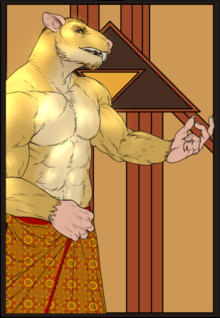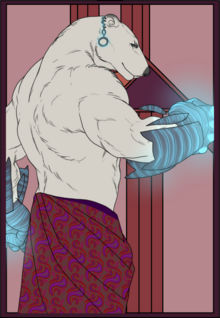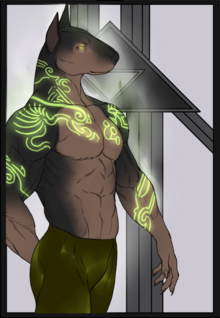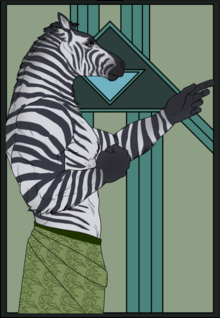More actions
| Baskarr | |
|---|---|
 | |
| Religion | |
| Pronunciation | Bas-Car |
| Origins | Dewamenet |
| Deities | |
| |
Origins
Baskarr, or the Faces of Baskarr as it is more commonly called, is a religion primarily worshiped by the Asha and Half-Asha, dating back all the way to the Dewamenet Empire. As a result, the Baskarr is one of the oldest if not the oldest continually worshiped religion for several tens of thousands of years. However, because of the Dewamenet-Allorn War, and the subsequent enslavement of the Asha to the Allorn, it is generally assumed in the modern era that what is modern Baskarr, is not the same as Dewamenet Baskarr, with aspects of the religion and nuances lost to time and Nelfin interference. The religion survived through word of mouth in enslaved communities, and after tens of thousands of years of separation, small differences and changes converged into new beliefs and concepts. As such, while it is perhaps the oldest continually worshiped religion, it is also an incredibly unstable religion that habitually experiences radical changes as ancient Dewamenet history and legacy is unearthed in the modern era.
Core Identity
Baskarr is a religion centered around the concept of Ma’at which is loosely translated to Karma in Common. Ma’at is the golden rule of the world to Baskarr, one that divines world order, peace, stability, hierarchy and correctness and justice. The idea that one will receive back what one does upon others, or that one will inflict back on others what has been inflicted on them. Everything that happens in the world to any person is deterministic because of what this person has done prior in their life, the sum of their actions, thoughts, emotions and wants and needs, and how the Gods arbitrate this process. The term Baskarr itself means Origins in the old Dewamenet language, with the five Gods of Baskarr believed to be the five original Asha from which all other Asha were born, created, or wished into existence, the topic of how the Asha were created exactly by their Gods still is a controversial one.
Tenets
- Bravery: Baskarr demands that its followers be brave, for bravery inspires others, and by showing bravery, the faithful can depend on others to show bravery and support when they are in need. Bravery in this context can also mean bravery not to be sinful or doubtful.
- Calm: Baskarr demands by nature a calmness and kindness to not inflict undue cruelty and harm onto others what has not already been inflicted on one’s self. Note this is not the same as passivity, it simply means that Baskarr faithful should not start a fight, but always end one.
- Pleasure: Baskarr permits its worshipers a great deal of personal leisure and satisfaction, proclaiming that the natural world itself has no Ma’at, and as such the world is the fruits of labor of the faithful to use in whatever way they wish and desire.
- Vengeful: Baskarr demands that Ma’at scores are settled. They are not strictly the same as revenge demands of other religions, but more a way of indicating that in the absence of divine retribution, the faithful should exact what was inflicted on them back onto the perpetrators.
- Charity: Baskarr honors the concept of charity through Ma’at, believing that what is charitably given, shall be equally received further in life. Charity and communal lifestyle are a major focus point of the Baskarr faith, and by extension much of Asha society.
- Honest: Baskarr does not demand honesty per se, but indicates that every lie is returned with a lie, no matter how big or small. For each lie uttered, the person will receive a lie in return, and most faithful don’t want to bargain with the risk of a white lie returned with a major lie.
- Pride: Baskarr is a somewhat unique faith, in that it demands physical perfection. Core to its concepts is the idea that in order to take care of others and receive their blessings in return, a person must first take care of themselves, their health, mental health, and appearance, and be prideful of them.
- Vanity: A very important aspect of Baskarr, because of the concept of Pride, is Vanity, and to display one’s means. Baskarr worshipers spend a lot on accessorizing and grooming themselves to the most ideal physical and mental presentation that they can present. Body modification is part of this, though there are notable exceptions such as Magical changes.
- Ma’at: The more core concept of Baskarr is Ma’at, or Karma, the idea that every action, thought, emotion, want, and desire, is paid forward and received back in some form later in life, and that the Gods hold the scales of balance of receiving and giving. The Afterlife also plays into this, in that if someone has much Ma’at due, they are permitted, but if they took too much, they are denied.
- Retribution: While most would consider Ma’at to be a tenet that results in a pacifist community, the exact opposite is true. The Baskarr faithful do not simply wait for the Gods to enact justice onto others, but do it themselves in most cases. This is even considered pious, because by enacting justice on a person before their death, the Baskarr faithful are balancing the scales, thus making their enemies more likely to pass into the afterlife, which is considered an act of kindness or compassion.
Beliefs
- Narrative: In Baskarr, each person born creates a new soul that is a challenge to the soul bearer. The world is filled with both good and bad things, and bad things in particular seduce the soul into acting out of Ma’at, or with excessive greed, excessive violence, or excessive denial of freedom of movement. Throughout life, the faithful enact decisions and actions on each other, which add onto a scale of balance between giving and taking that each soul represents. Also, a person can make amends for evil deeds, or be inflicted retribution upon their soul by others, thus correcting any imbalances. When a Soul passes to the Afterlife, which is called the Dauat, the gods weigh the soul’s value against that of a feather, which is said to weigh a near zero when it comes to Ma’at. Those who have sinned a lot have a heavy soul, while those with good Ma’at have a lighter soul, thus making the feather heavier. Those who are rejected are sent back to Aloria, and condemned to live the life of a diminutive animal. For example if a feline Asha’s soul was deemed too heavy, they are sent back to Aloria to live their life as a domestic cat. This is also why Baskarr worshipers hold specific animals in holy esteem. Even though they are burdened souls, repentance as a domestic or wild animal is considered holy repentance, and to kill such an animal is considered a grave crime against the Gods. Souls that are deemed light enough to stay in Dauat however are given their own boat and sent sailing on the eternal ocean. It is said that the Dauat is an eternally calm ocean under a perfectly lit starry night sky, where the souls of those deemed worthy sail forever without need or want, and able to visit the boats of their friends and loved ones, as well as pets. Because pets go to the Dauat automatically (domestic animals cannot commit sins), it is believed that those who are condemned to be reincarnated as a dog or a cat will automatically pass to the Dauat once their repentance is up. This makes Baskarr a unique faith in that it is the only religion where everyone gets to go to the afterlife of pristine quality, regardless of how badly they behave, though being re-incarnated is still considered a huge risk. While Baskarr worshipers hold domestic cats, dogs, otters and horses in high esteem and consider them holy animals, other religions do not. If a domestic cat in which a reincarnated soul resides is killed by someone who is not a Baskarr worshiper, the soul is destroyed and disappears forever. This is why Baskarr worshipers abhor animal abuse or the slaughter and eating of holy animals.
- Asha Faith: Baskarr is technically a religion for only Asha, however the explosion of Half-Asha in Asha societies as well as some converts of non-Asha who worship Baskarr, cause some complication with the religion. The whole of the Baskarr reincarnation cycle is based on the person being an Asha, so lacking Asha physiology in the purest sense causes problems. Most Baskarr priests have agreed on a principle of adoption, meaning that a Half-Asha is guaranteed entry since they have some Asha blood, but also that non-Asha can enter the Dauat if they are soul-bound to an Asha or Half-Asha. This soul binding ritual can be between lovers, friends, siblings, it doesn’t really matter. The non-Asha’s soul is however valued based on the Ma’at of the Asha or Half-Asha they are attached to. If for example the Asha is deemed unworthy, then the non-Asha’s soul (when they inevitably reach Dauat) they will also be deemed unworthy, and vice versa.
- Holy Animals: Here follows a list of all Holy Animals to the Baskarr Faith: Domestic Cats, Large Cats, Domestic Canines, Wild Canines, Otters, Beavers, Horses, Donkeys, Rats, Squirrels, Rabbits, Mice, Ferrets, Deer, Bears, and Primates. Notably not included are any bovine, avian or fish species. This is because none of them are found among Asha appearances, thus safe to hunt and consume. Many Baskarr worshipers as a result are pescatarian, as only consuming fish meat ensures that no accidental holy animal meat is consumed.
- Canon Evil: There is no true Canon Evil for Baskarr worshipers, they acknowledge that evil resides in all creation, even the Gods themselves, and that evil is simply giving in to evil actions that inflict suffering, harm, or loss on others. However, there are certain things that are more prone to evil than others. Baskarr worshipers in particular identify Magic users and the Afflicted as more prone to evil than others, and likely having a much worse Ma’at. Baskarr worshipers are not necessarily hostile to Magic users, but must always acknowledge that these practitioners are capable of extreme harm, even accidental, and within the scope of Asha history have committed the greatest evils of all, genocide and enslavement.
- Identity: Baskarr has explicit genders, male, female, and the “third”, which is best understood to be non-binary. This applies to both genders and sexes. There is no distinction towards sexual orientation, or gender-identity bias, though there are certain traits that are strongly identified with gender-identity bias. For example, the god of fertility and progeny is male, and as such, virility or fertility is considered a male trait, while the goddess of knowledge is female, and as such, foresight and intellect are distinctly female traits. Non-binary individuals are capable of claiming both because Baskarr considers non-binary to imply “both” instead of “neither”.
- Conversion: Baskarr has no real laws on conversion, though there is a general expectation that all Asha and Half-Asha should be Baskarr, and if they are not, they should be convinced to follow Baskarr by the other Asha in their community. Non-Asha can join so long as they engage in the soul-bonded ritual and offering. Conversion away from Baskarr is not strictly illegal in that it does not cause anyone to wish to inflict violence, however it is considered a complete loss of Ma’at, because rejecting the God causes them to put stones on the scale. Converting away from Baskarr does not mean the Gods do not get to judge the soul.
- Sins & Taboo: The worst cases of sinning and taboo for Baskarr are enslavement of others, genocide and mass-violence, using Magic to murder, lack of hygiëne and lack of self-care and exercize, killling and or consuming the meat of Holy Animals, destroying statues of the Gods, and impeding on the freedom of movement of others, except when that should be to inflict harm, commit crime, or invade private property.
Gods and Goddesses
Baskarr has the so-called Faces of Baskarr. The Faces refer to each of the Gods, thus the Gods are the “Faces of Origins”. The exact nature of the Faces is still highly debated among the Baskarr worshipers, Some believe them to be imminently divine individuals who existed before the Asha, others believe them to have been immensely powerful Asha who were born divine and thus shaped the faith as they came along. Whatever the truth, it is known at least that the five Faces were present during the Dewamenet days. There are presumed to be other Gods, and some of the excavations in the Ithanian Desert have revealed as much, but many of the details of the Otter and Okapi Gods have been lost to time, even if they can roughly be identified. Because no common consensus can be created for these Gods, they are not officially included, but many Baskarr faithful await the days that their pantheon is once more complete.
Akhet, Lord of Thousand Sons
 |
Akhet is the oldest and most powerful of the Baskarr Gods. His other names are the Sun-God, and the Lord of Thousand Sons. Akhet is an immensely large and bulk-muscle framed Rat Asha with golden metallic fur that shines brightly in the sunlight. Askhet has bright golden eyes Akhet is traditionally depicted with the orange Satoor, his symbol being a red sun with yellow accents. Akhet is usually depicted in some inviting or luring pose, drawing viewers in closer, appearing as if he is about to unclasp his Satoor. Akhet is represented by the sun, and so he is primarily a god of fertility and agriculture but also wealth and opulence. Akhet is also the god of war and combat, raw strength and leadership. Akhet’s greatest flaw is that he is beset by an unquenchable thirst for the pleasures of life, such as drinking wine, eating food, and the carnal desires.
Akhet’s blessings are wished for to bring good harvests and to stave away the wet seasons that cause harvests to rot, but also not to bring too much arid dry sunlight and scorch farms to nothingness. He is also worshiped for physical strength and victory in combat, as well as wealth and progress. Equally, Akhet’s curses are infidelity and loneliness. Baskarr worshipers believe that inappropriate hornyness is caused by Akhet’s influence, and have as such adopted the practice of “beating the Akhet out”, by slapping a person on the back of the head who is acting inappropriately. Akhet worship is considered quite expensive which is why it is only done very rarely. To worship Akhet, small amounts of leaf-gold are bought, which are rubbed between the hands, before being allowed to fall down into a bowl of water, where they sink to the bottom and remain. With each prayer, the amount of gold-leaf flakes in the bottom increases, until it is completely covered in gold-leaf, after which it is heated and baked-in, after which it can be used to drink wine which is considered good fortune, to drink from Akhet’s bowl. Akhet can also be invoked on the battlefield however. A final curiosity of note is that Akhet is considered somewhat of a mischevous god who frames a lot of his activities in what conquests he can make. Akhet is usually depicted as bisexual, though there are plenty of folklore stories of him disguising as a normal rat-asha with a golden fur-patch on his back, and stealing men’s wives. When someone acts horny in public, or performs a badly executed flirt, Baskarr worshipers may say “For Akhet’s sake” to notify their disappointment or revulsion. |
Yah, Lady of the Heavens
|
||||||||||||||||||||||||||||||



